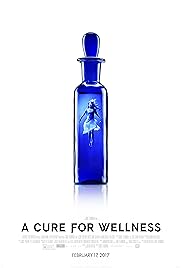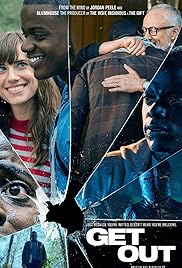A Cure for Wellness, 2017; directed by Gore Verbinski; written by Justin Haythe
Get Out, 2017; written and directed by Jordan Peele
Spoiler alert: In each of these films good triumphs over evil.
And that, in a nutshell, is my major complaint about
A Cure for Wellness and
Get Out. Both are good (and in the case of
Get Out, great) films. But both would have benefited from darker endings.
More and more, it seems otherwise fine, dark-tinged films are abruptly switching gears in the third act for the sole purpose of delivering an upbeat ending with no lingering questions. No matter how dire the circumstances, in the end the main character(s) will breathe a happy sigh of relief, glad that
that's finally over.
I call this phenomenon the Tyranny of the Happy Ending, and it's led to the downfall of several otherwise satisfying thrillers and horror films over the years.
Here's a short list off the top of my head: The young girl in
The Monster defeats the titular terror with her mom's Zippo and an aerosol can of antiseptic spray. In
It Follows, the teens dispatch the creeping menace using a combination of small electric appliances and a public pool. Mia Wasikowska walks away from all the horrors of
Crimson Peak. The heroine of
Hush corkscrews her assailant.
The Visit concludes with a freestyle rap. The aliens in
Signs are undone by a glass of water, on a planet that's 75% covered with the stuff.
Notice the trend? No matter how powerful the antagonist seems or how desperate things have become, good must prevail. I understand the reason: audiences, supposedly, prefer happy endings. But a happy ending is not always a satisfying one, especially when it requires the storyline to tie itself in knots or blow holes in the plot.
I'm not saying this always happens, but the exceptions are rare. Yes, Anya Taylor-Joy survived every vexation of
The Witch and gave herself to Satan. The couple who decided to attend
The Invitation survived only to see red lamps illuminating the California hillside. Elle Fanning was literally consumed in
The Neon Demon. And Thomas Jane drove himself to the bitterest of ends at the conclusion of
The Mist.
I think
A Cure for Wellness and
Get Out would have done themselves -- and audiences -- a favor if they'd opted to join the latter group. Instead, each one pulls its punches. Rather than striking a mortal wound that would have stuck with their protagonists -- and audiences -- they allowed us to walk away relatively unscathed, breathing a sigh of relief, glad that
that's finally over.
There's a moment in
A Cure for Wellness, 15-20 minutes before the final frame, that would have made for an ideal ending. I can almost imagine an earlier version of the script concluding then and there, before a Hollywood overseer demanded both more spectacle and absolute neatness. Dean DeHaan is sitting on a bench, gazing emptily at the sun as it sets on the valley below and the mountains beyond. He's been through eighteen different kinds of hell at this point and the experience has changed him forever. "Why would anyone want to leave?" he asks his companion, something horribly absent in his voice. It's a chilling moment, and such a fitting end I was literally gathering my empties, sure the credits were about to roll.
Instead the film served up a fourth, superfluous act in which DeHaan's character somehow pulls himself together, conquers the villain and escapes with the film's heroine practically on his arm.
Get Out, despite all its intelligence and nerve, finishes in much the same way.
And in my book, that's a mistake.
Here's why: I once had a playwriting teacher who told us never to end something with the old It Was Only a Dream! ploy. "You might as well tell your audience they've wasted their time," he said.
The Tyranny of the Happy Ending is the 21st century version of It Was Only a Dream! It doesn't matter how bad things get, how grim everything becomes, how impossible the situation seems. The hero will prevail in the end. He or she always does. Fear not. It was all a dream. Everything will work out just fine. You've wasted your time.
One of the great things about stories, one of the reasons they exist and endure at all, is that they teach us how to deal with life's challenges. And a story that so easily defangs its villain does us a disservice. Because life's challenges aren't always so easily defanged. Real life doesn't work that way, and and neither do some of the best stories, the ones we remember long after they're done.
The couple at the end of
Cloverfield don't beat the monster that's laid waste to Manhattan; they die in a last-ditch effort to stop it. Mia Farrow doesn't turn her knife on all the devil worshippers in
Rosemary's Baby; we watch as some dark maternal instinct takes control of her. Katherine Ross doesn't burn down the men's club at the center of
The Stepford Wives; she stares at us blankly from a supermarket aisle. Duane Jones doesn't kill the zombies and save the girl in
Night of the Living Dead; a Pennsylvania militia shoots him in the head. Joan Crawford doesn't concoct a plan to kill Bette Davis in
Whatever Happened to Baby Jane?; she bakes in the hot sun while her mad sister dances for a camera that's no longer there.
As a result, we remember these films, long after they left the theaters. They stick with us -- you might even they
haunt us -- not because everything worked out fine at the end, but precisely because it didn't.
There's a saying that good judgment comes from experience, and experience comes from bad decisions. Maybe that's why I prefer one type of ending over the other. Both teach us lessons. But the ones from unhappy endings stick around far longer than the others.



